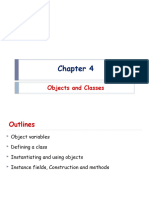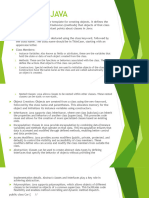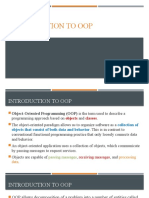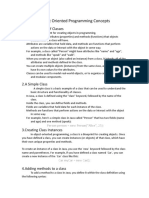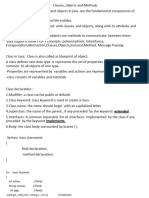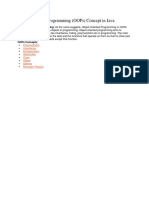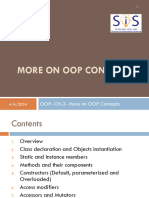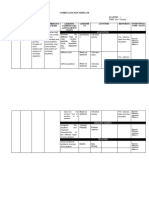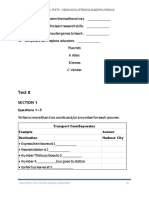OOP - Objects & Classes Reviewer
Key Concepts and Statements
1. 1. Object-Oriented Programming (OOP)
• Development Complexity: OOP makes development easier, not more complex. Statement:
False
• Procedure-Oriented Programming: As code increases, procedure-oriented programming
can lead to code redundancy. Statement: True
• Object Definition: OOP is a programming method that defines objects, which are tasked
with specific behaviors or functions. Statement: True
• Data Hiding: OOP provides data hiding, unlike global data in procedural programming that
can be accessed anywhere. Statement: True
• Real-World Problem Solving: OOP offers solutions that are well-suited to real-world
problems. Statement: True
2. 2. Java Naming Conventions
• Java Naming Convention: Java has specific naming conventions for readability and
consistency. Statement: True
• Syntax vs Naming Rules: Java syntax rules should not be confused with naming
conventions. Statement: (True but confusingly stated)
• Dynamic Java Naming Rule: Java does not have a 'dynamic' naming rule. Statement: False
• No White Spaces: Names in Java must not contain white spaces. Statement: True
• Basic Characters Only: Special characters are generally avoided in naming. Statement:
False
3. 3. Object Instance
• Object: An object is an instance of a class. Statement: True
Identifications and Definitions
1. Class: A blueprint for creating objects with shared properties and behaviors.
2. Parameterized Constructor: A constructor that accepts specific parameters to initialize an
object.
Steps in OOP
1. Declaration: Defining the class or object.
2. Instantiation: Creating an instance of the class (object).
3. Initialization: Setting initial values to variables or properties.
Important Terms and Concepts
1. Default Constructor: A constructor with no parameters, providing default values if none
are specified.
2. Instance Variable: A variable that belongs to an instance of a class.
3. Java API (Built-In Packages): Classes included in the Java Development Environment for
reuse.
4. Constructor Overloading: Defining multiple constructors in a class with different
parameters.
5. `this` Keyword: Refers to the current object’s variable or method.
6. Modifier: Changes the accessibility or behavior of a class, method, or variable.
7. Behavior: Defines the functions or methods that determine an object’s behavior.
8. Class Variable: A variable that belongs to a class rather than instances of the class.
9. Predefined Method: A method provided by Java for common operations.
10. Block: Denoted by curly braces `{}`, it groups code statements together.
11. Method Body: The code or functions within the curly braces of a method.
12. `this` Keyword: Refers to the current object in a method or constructor. It is used to
eliminate confusion between class attributes and parameters with the same name.
13. Constructors: The method called when you instantiate a class to create an object.
14. Object Methods: Methods declared inside an object class that represent the object's
purpose or behavior.
15. Polymorphism: The concept of 'different forms', where one entity provides multiple
implementations or behaviors.





